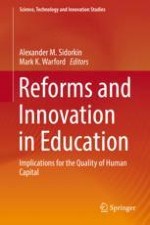Abstract
Reforms are an ever-present part of educational policy across the world (Cuban 1990). Yet even in this ever-turbulent context, the 1980s stand out in terms of massive government and public disillusionment with education in various parts of the world. Nation at Risk report of 1983 in the USA as well as Education Reform Act of 1988 in the UK are but a few examples of an overall criticism of schools’ capacity to provide better lives for their graduates, which spread over English-speaking countries at the time in the 1990s; these debates, together with the growing influence of international organizations including World Bank (Heyneman 2003), delineated a whole stream of research literature, including Fullan’s influential works on educational change (Fullan 1999; Fullan 2001). Fullan embraced the reform process in education as a policy or a set of policies that follow orderly stages from initiation to implementation and, later on, institutionalization (2001). What this conception apparently requires is an implied bedrock of common ideas and norms, as well as a shared knowledge of basic rules of social interactions, i.e., social institutions (Waks 2007, p. 285). Fundamental changes would not have been ever possible had they not been preceded or reinforced by the transformation of values. For this transformation to occur, a public arena, where various arguments might circulate, has to be in place since a commonality of norms or their difference reveals itself through open debate. Those arguments are usually accumulated by collective entities standing for a group of individuals sharing a common national, professional, or class identity. A network of collective stakeholders makes public debate possible and even inevitable. Yet we have to admit that connection of institutions and civic organization is not an inherent product of human history. Shared norms might be acquired and actually are acquired by various means. Henceforth I use the term “institution” to refer to a particular body of shared norms, rules, and viewpoints that arise from a variety of contexts. I use the term institutionally weak context to refer to such context where the existence of institutions is a subject of suspension or outright neglect. Under such circumstances no fundamental change in Waks’s terms could happen since there is no any common set of norms shared across society to benchmark transformation. Moreover, it is precisely this subversion of common norms and ideals which was most eagerly sought after by the citizens of the late USSR. Paradoxically, the outburst of political activity during Perestroika entailed unforeseen decline of civic bonds with almost no nongovernmental organization (NGO) to stand up alongside the state in the public eye. In the field of educational policy campaigning for “humanization,” which presumed respectfulness toward students’ personality, rapidly swept the pendulum of reform too far away from “a common sense of citizenship” (World Bank 1995, p. xv). Although the obvious demise of public and political spheres after the collapse of the Soviet Union, the weakness of civic institutions was very much a product of radical individualism that flourished during and after Perestroika (Prozorov 2009). Social activities evolved around a highly selective process of creating one’s own private public out of small number of entrusted friends that took shape already in 1970s (Yurchak 2006) and survived easily after the collapse of the USSR. The Soviet pedagogical Innovation Movement represented one of the clearest instances of this privatization of public sphere. The merging of pedagogical innovations with active promotion of such privatized publicity has had dramatic effect on the movement’s sustainability, diminishing its capacity to bring systemic change into the secondary education in post-Soviet Russia. Our theoretical question is whether subjective implications of innovative processes largely dominated their diffusion within the institutionally weak context of late Soviet socialism and the new Russia of 1990s and why that happened. This subjectification of innovations was first detected through close reading of research philosophical and/or (auto)biographical accounts produced by members of the Innovation Movement of the time and afterward (Kasprzhak 1992; Schedrovitsky 1993; Dneprov 2006, p. 79; Nemtsev 2006; Pinsky 2007, p. 139). Since all of them unanimously emphasized paramount importance of freedom as a primary condition of pedagogical innovation, the task of my own research was to pinpoint this constellation against the background of a comparative historical account of the two superpowers’ educational innovation policies after 1945 and analyze interviews with the former members of innovative movement, periodicals, and archival materials.
